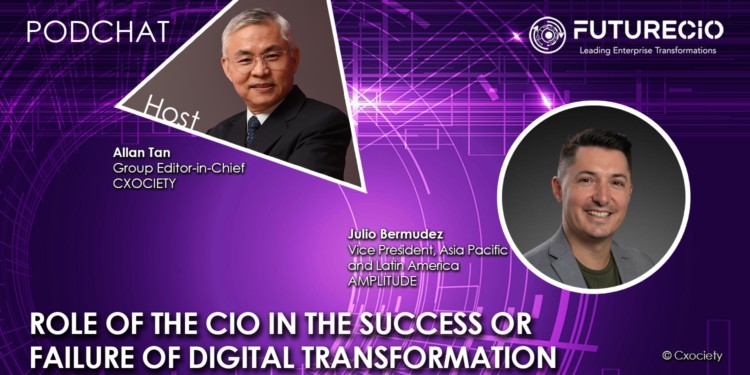Digital transformation (DX) is more important as we progress into the Fourth Industrial Revolution. Today the lines between the physical, digital, and biological worlds are blurring, as consumers and businesses embrace the realities of a more digitally connected economy.
Bain’s global study of 1000 companies revealed only 5% of digital transformations achieved or exceeded the expectations set for the effort.
Despite the imperative to accelerate transformation in 2020, the journey remains fraught with challenges, with failed attempts predicted to come out in 2021.
Why is that? What’s missing? What are organisations getting wrong?
Julio Bermudez, vice president of Amplitude, Asia Pacific and Latin America, says leaders need to understand is that this (DX) is an evolving framework – a culture of how you conduct business activities.
“It doesn't matter whether that involves external factors, like the products that you sell, or internal, like, how are you using data to drive decisions within meetings. It isn't an end state project but rather a culture and a framework that you need to absorb as a company, to be able to handle the changes that are coming down the pipe,” he continued.
Critical elements of DX
Bermudez cites the extraction of data from silos, and its placement in the hands of people that need it as critical elements, as everyday struggles in the quest to digitise the enterprise. But rather than putting the blame squarely on technology, he opined that the challenge is culture.
Acknowledging his idea as more abstract, he goes on to say that companies with a data-driven culture push that mindset out into the workforce. The aim is to have this data-driven mindset to be absorbed authentically, into everybody that is a part of the organization.
CIO as an enabler of a data-driven culture
Bermudez conceded that it’s tough to be the CIO in the current environment: lots of things to consider when it comes to technologies that will futureproof the future of the business. He acknowledged the difficulty of successfully future-proofing things.
Beyond the IT architecture, CIOs are also responsible for helping the business (users) adopt the culture of utilising the data. It is no longer just about dumping the technology into unsuspecting users. It is about educating and encouraging users on the merits of the technology and enabling them to transform how they work.
“And that is something that I think is a little bit harder for companies to get off the ground, especially as you start having thousands of employees that you're wanting to help participate in this change management. CIOs need to be thinking, both from a systems standpoint but also from the process and most importantly, the people standpoint,” he continued.
The wrong question
Bermudez observed that during the early days of transformation initiatives focus was mostly on how to get data to the place where decisions needed to be made.
And for him, this is the mistake. The focus should not just be on the how, but the why as well. “The most forward-thinking and successful transformation occurs when companies starting utilising the data to understand the why behind what is happening,” he opined.
Applied in the right context, and the right question, data can help lead to better insights that drive product development and revenue – also mitigate the risks of an investment in the wrong question.
Success or failure of DX is a team responsibility
In the book Why Digital Transformations Fail, author, co-founder of Inixia and former P&G executive Tony Saldanha wrote: “Companies either transform or die in industrial revolutions. Digital transformation is our current generation’s attempt to transform in the face of the Fourth Industrial Revolution. However, the sad truth is that 70% of all digital transformations still fail today… a shocking number, given the extremely high stakes.”
Saldanha attributes the failure to any number of reasons: an inadequate strategy; competitive pressures; technology; talent; culture.
While all these factors are important, “The surprising answer to why digital transformations fail is a lack of discipline in defining and executing the right steps for digital transformations to take off and stay ahead,” noted Saldanha, adding that “It is possible to apply the proven checklist methodology from the airline and medical fields to improve the 70% failure rate.”
For Bermudez, transformation success (and failure) should not rest on the shoulders of one person.
Everyone from the CEO down has a role to play.
“It is not just about getting the technology right. It is also about the culture and the soul of the company. And so, you need to have sufficient buy-in at the top, to go through that kind of change management,” he concluded.
Click on the PodChat player above and listen to Bermudez elaborate on the role of data in the digital transformation journey of an enterprise.
- What is driving the desire to undertake a digital transformation initiative?
- What is leadership thinking right and wrong about digital transformation?
- What are the critical elements that comprise a digital transformation journey?
- What is the role of the CIO in an organisation’s digital transformation journey?
- How significant is the role of technology towards an organisation’s digital transformation journey?
- How the above gets translated into technologies that need the support/oversight of the CIO and IT team?
- How do CIOs in ASEAN ensure that their digital investments lead to business outcomes that support the goals of their company?
- In this book, Why digital transformations fail, Tony Saldan estimates that 70% of DX initiative fail. Who should be accountable for ensuring the success and failure of DX projects?
- What is Amplitude’s value proposition in DX?




